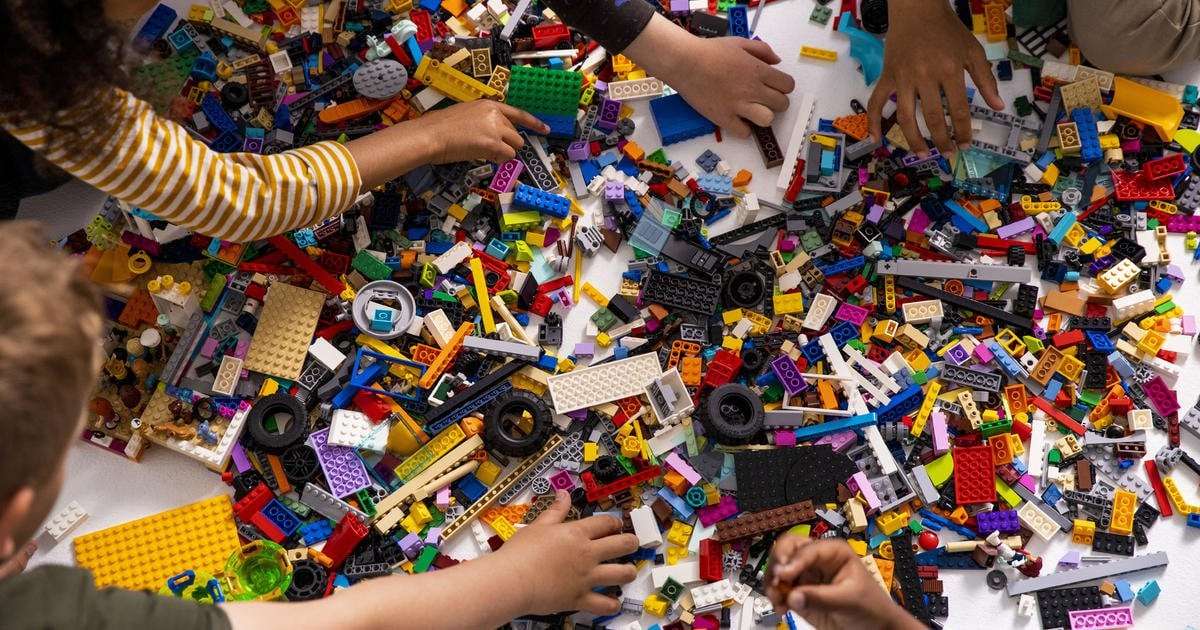Copenhagen, Denmark — Denmark's Lego said on Monday that it remains committed to its quest to find sustainable materials to reduce carbon emissions, even after an experiment by the world's largest toymaker to use recycled bottles did not work. Lego said it has "decided not to progress" with making its trademark colorful bricks from recycled plastic bottles made of polyethylene terephthalate, known as PET, and after more than two years of testing "found the material didn't reduce carbon emissions."
Lego enthusiastically announced in 2021 that the prototype PET blocks had become the first recycled alternative to pass its "strict" quality, safety and play requirements, following experimentation with several other iterations that proved not durable enough.
The company said scientists and engineers tested more than 250 variations of PET materials, as well as hundreds of other plastic formulations, before nailing down the prototype, which was made with plastic sourced from suppliers in the U.S. that were approved by the Food and Drug Administration and European Food Safety Authority. On average, a one-liter plastic PET bottle made enough raw material for ten 2 x 4 Lego bricks.
Despite the determination that the PET prototype failed to save on carbon emissions, Lego said it remained "fully committed to making Lego bricks from sustainable materials by 2032."
The privately-held Lego Group, which makes its bricks out of oil-based plastic said it had invested "more than $1.2 billion in sustainability initiatives" as part of efforts to transition to more sustainable materials and reduce its carbon emissions by 37% by 2032, Lego said.
The company said it was "currently testing and developing Lego bricks made from a range of alternative sustainable materials, including other recycled plastics and plastics made from alternative sources such as e-methanol."
Also known as green methanol, e-methanol is composed of waste carbon dioxide and hydrogen, created by using renewable energy to split water molecules.
Lego said it will continue to use bio-polypropylene, the sustainable and biological variant of polyethylene — a plastic used in everything from consumer and food packaging to tires — for parts in Lego sets such as leaves, trees and other accessories.
"We believe that in the long-term this will encourage increased production of more sustainable raw materials, such as recycled oils, and help support our transition to sustainable materials," it said.
Lego was founded in 1932 by Ole Kirk Kristiansen. The name derived from the two Danish words, leg and godt, which together mean "play well." The brand name was created unaware that lego in Latin means "I assemble."

GeneralZaroff1 on September 25th, 2023 at 13:01 UTC »
A friend of mine works for a major recycling company that does most major brands “upcycle” programs. Basically if you shop at a major brand from Nike to lululemon chances are their clothes are processed by his company. The truth behind the recycling world is fucking depressing. The vast majority of “green initiatives” are less than 10% effective.
The average American buys 68 new pieces of clothing a year. That’s 5 TIMES more than they did in 1980’s, and that was before the pandemic online shopping boom and when Temu and SHEIN became popular.
Even for better brands that TRY to do their best it’s not possible because mixed material have become so common. But the real nightmare is going to be companies like H&M, Zara, etc. where the amount of inventory that goes from manufacturing to disposal WITHOUT EVEN HITTING SHELVES is nuts. That and the “try size and return” means every product sold is average at 3 pieces that are trashed.
Every time you return something on Amazon it’s most likely going into the landfill not back on the shelves because it costs more to inventory, sort, ship and repackage than it does to manufacture new. So most of what they do is to shred/ puncture so it can’t resell and dispose. Returning in store is better because at least the staff can reshelf.
Our children’s children are going to hate us.
Edit: turned out it was 68, not 64 garments a year.
Stealth_NotABomber on September 25th, 2023 at 12:31 UTC »
Not a surprise. There's a finite amount of times you can break certain plastics down and reuse them. Not to mention many types aren't able to be recycled. Just like with many things, recycling is sometimes as expensive if not more than just making it new.
Scifi_fans on September 25th, 2023 at 11:51 UTC »
Also good to know, as someone who worked in plastic industry: Plastic can't be infinitely recycled, it degrades over time and eventually it's not usable... we will have a major issue with plastic in the next decades.
Edit#1: On behalf of the many who corrected me: "chemical recycling" can "potentially " make some plastics infinitely recyclable. On my short experience in that industry, I never saw a single client/supplier involved in it.
Edith#2: Yes we have a health/environmental issue with plastic right now, but give it a few more decades to fully set in...